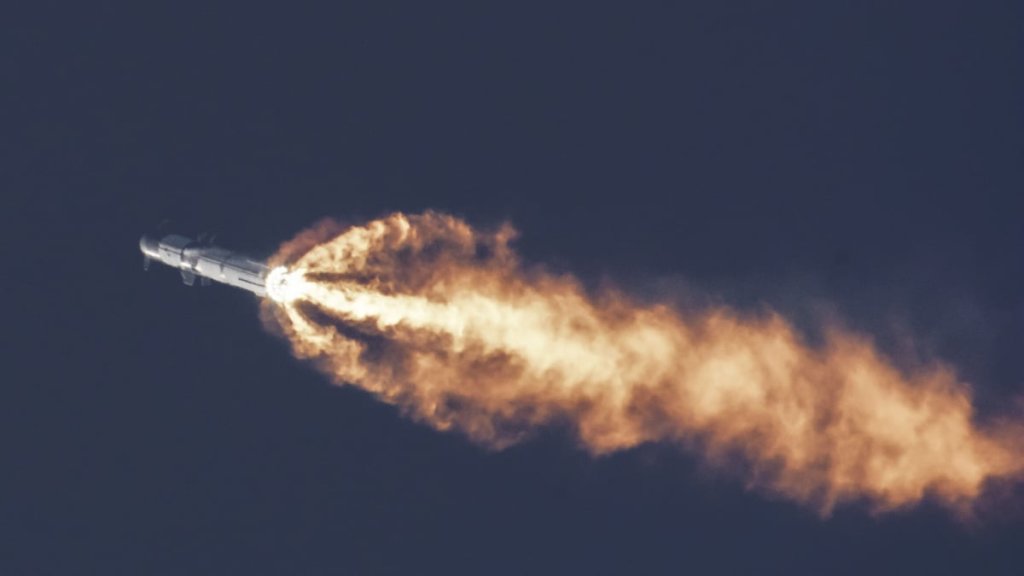About four minutes after SpaceX‘s gargantuan rocket lifted from its Texas launch pad, it burst into a fireball over the Gulf of Mexico, never reaching space.
Though SpaceX hasn’t shared many details yet about what happened during Starship’s maiden voyage, one fact is known: It was intentionally ordered to explode.
Rockets are destroyed in the air when people’s lives could be even remotely at risk of falling debris. In the days since the uncrewed test, no injuries or major property damage appear to have been reported.
When the rocket launched at 9:33 a.m. ET April 20, 2023, some of the rocket’s 33 booster engines had either burned out or failed to light from the start. As Starship ascended, cameras caught views of the flames underneath it, appearing to show some of the engines had cut out.
In a statement(opens in a new tab) released after the incident, SpaceX said Starship climbed to about 26 miles over the ocean before beginning to lose altitude and tumble. Then, self-destruct commands were sent to the booster and ship, which hadn’t separated as planned, the company said.
What ultimately initiated that disintegration isn’t completely clear, Dan Dumbacher, executive director of the American Institute of Aeronautics and Astronautics, told Mashable.
“Now it’s a pure race as to whether the aerodynamic pressure breaks the vehicle up or the flight termination system does,” he said, “but it really doesn’t matter because the end result is the same.”

Credit: Screengrab from SpaceX broadcast
Starship is a super-heavy-lift rocket and spacecraft, built to carry immense cargo and astronauts into deep space. The 400-foot-tall stainless steel skyscraper has about twice as much thrust as NASA‘s mega moon rocket that flew into space for the first time five months ago and is fueled with 10 million pounds of liquid methane and oxygen.
SpaceX is used to blowups, and prior to the launch, billionaire founder Elon Musk was frank about the odds for the rocket to work on the first try.
“There’s a lot of risk associated with this first launch, so I would not say that it is likely to be successful,” he said during a video conference with a National Academies panel in 2021. “But I think we will make a lot of progress.”
Despite Starship never having reached space, industry experts largely regarded the launch as a partial success because the rocket managed to clear the launch tower and traveled higher than any Starship prototype had before.
Meanwhile, the general public seemed unsure of how to think of the whole thing: After all, usually, when something big and expensive goes boom, it’s considered bad. But SpaceX has always approached rocketry differently from NASA, working a little messier and faster to achieve its goals.
In terms of the explosive ending, Dumbacher said spaceport safety officers are required to terminate a flight if a rocket meanders into an area where the risk of debris hitting someone on the ground could exceed a probability of one in 30 million.
“People ought to be looking at this as good — the flight termination system, if it was needed, actually worked,” he said.
Want more science and tech news delivered straight to your inbox? Sign up for Mashable’s Top Stories newsletter today.
Flight termination systems usually consist of a computer wired to explosives within a part of the rocket that allows for the vehicle to be quickly destroyed without causing a huge blast or igniting the remaining fuel. These mechanisms exist in every rocket licensed to launch.
Thursday’s orbital flight test was a crucial demonstration of hardware NASA is depending on to get humans back on the moon in the next few years. The space agency has a $4 billion contract with SpaceX(opens in a new tab) to use Starships to land astronauts on the moon during Artemis III and IV(opens in a new tab), two upcoming missions that could come as early as 2025 and 2028, respectively. As part of the deal, the company will need to conduct a successful uncrewed test flight to the moon beforehand.
During the test flight, the colossal booster was supposed to separate(opens in a new tab) from the rocket about three minutes after liftoff, then drop into the ocean. The ship would fly 150 miles into space above Earth, then splash down off the Hawaiian coast(opens in a new tab) about 1.5 hours later.
NASA administrator Bill Nelson congratulated SpaceX on Thursday, framing the flight attempt as a bold step in the right direction.
Credit: SpaceX
SpaceX will be poring over its data from the brief flight to figure out what led to the problems with the engines and the booster not separating.
The Federal Aviation Administration will oversee an investigation into the mishap, a standard practice for such anomalies. Starship will be able to fly again after the agency determines “any system, process, or procedure related to the mishap does not affect public safety,” according to a statement released to Mashable.
“If anything, I would like people to view this as a learning experience for SpaceX, not as a failure,” Dumbacher said. “They’re going to eventually get the system working because of what they learn on these flight tests.”

